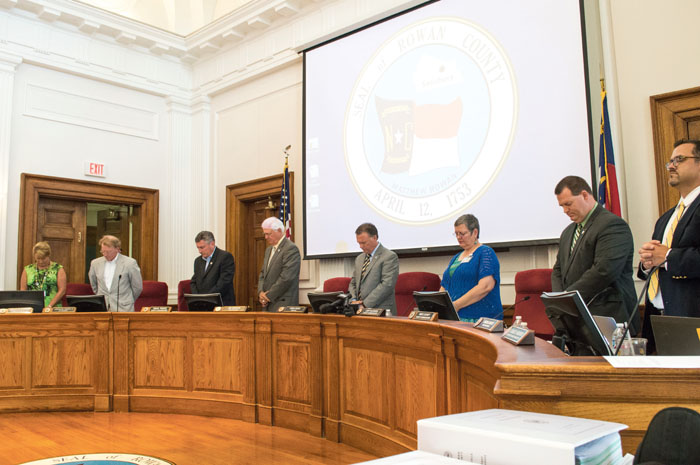Elizabeth Cook: Rowan’s prayer case likely to go on
Published 12:18 am Sunday, July 16, 2017

- Rowan County commissioners and county staff stand for a prayer before the start of a meeting. Salisbury City Council has voted to start its meetings with a moment of silence.
Prayer has always meant a great deal to the residents of Rowan County. So it’s important that people of faith understand what’s at stake as county officials ponder a court decision ruling commissioners’ meeting prayers unconstitutional.
This is not about whether you as a citizen can pray when and where you want. It’s about government officials and the prayers they conduct during official meetings.
It’s about the tension between commissioners’ role as government officials, and their personal First Amendment rights to speak and practice faith as they wish.
On Friday, the 4th U.S. Circuit Court of Appeals ruled in Lund vs. Rowan County that the commissioners’ prayer practice from 2006 to 2013 was be “unconstitutionally coercive.”
At issue is commissioners’ tradition of starting board meetings with one member giving a sectarian prayer — in this case, always Christian — inviting everyone in the meeting room to rise and bow their heads in prayer with them.
On behalf of three Rowan residents who took issue with the practice, the ACLU filed suit against the county in 2013. Even though no one is required to stand and join in the prayer, at least one of the plaintiffs said she feared commissioners would hold that against her when she addressed the board on other matters.
Commissioners have yet to vote on whether to appeal last week’s decision, but it’s hard to see how they could not. The county has taken the battle this far. Stopping now would seem to frustrate the desire to have a final, definitive answer from the nation’s highest court.
• Middle District: First, commissioners’ prayer practices were declared unconstitutional in 2015 by North Carolina’s Middle District Court.
Judge James Beaty said the board’s practice of having commissioners lead prayer at meetings creates a “coercive setting” and violates the Establishment Clause of the Constitution. “The Commissioners are the solely eligible prayer-givers and provide prayers according to their personal faiths …The prayers are thus effectively being delivered by the government itself,” he wrote. The county appealed the decision.
• 4th Circuit panel: The next decision by the 4th Circuit Court of Appeals went in the county’s favor, with a three-judge panel in 2016 ruling 2-1 that commissioners’ prayer practices did not violate the separation of church and state.
Judge G. Steven Agee wrote that the court found no evidence the commissioners, as a board, crafted prayers to say before meetings. Instead, prayers were a personal creation and were given for the benefit of members of the board.
Agee cited “a clear line of precedent not only upholding the practice of legislative prayer but acknowledging the ways in which it can bring together citizens of all backgrounds and encourage them to participate in the workings of their government.”
The ACLU appealed, asking for the full Appeals Court to hear the case
• Full 4th Circuit: In Friday’s ruling, by a 10-5 count, the 4th Circuit en banc panel affirmed the opinion of North Carolina’s Middle District Court.
Judge J. Harvie Wilkinson wrote: “Our Constitution seeks to preserve religious liberty without courting religious animosity. In this quest, our two religion clauses have been a great success. … And yet free religious exercise can only remain free if not influenced and directed by the hand of the state. On this score, the county simply went too far.”
The county now is poised to choose its next step, and appeal seems likely. If the U.S. Supreme Court declines to take the case, commissioners will have their answer — one they would not like. The 4th Circuit ruling that their practice was unconstitutional would stand.
If the court takes the case and rules in Rowan’s favor, the county will have played a historic role in defending official prayer.
With the addition of Justice Neil Gorsuch, the U.S. Supreme Court has a more conservative bent than the full 4th Circuit.
On President Trump’s travel ban, for instance, the 4th Circuit ruled to keep the order on hold, with the chief judge writing that the ban “drips with religious intolerance, animus, and discrimination.”
The Supreme Court, on the other hand, agreed to let the travel ban go forward with strict limits while the justices examine the scope of presidential power over the border.
The Alliance Defending Freedom, the group providing legal counsel to Rowan County, issued a statement Friday from Senior Counsel Brett Harvey: “All Americans, including public servants, should have the freedom to pray without being censored.”
Now that it’s gone this far, Rowan County should press that case all the way to the top.
Elizabeth Cook is editor of the Salisbury Post.

